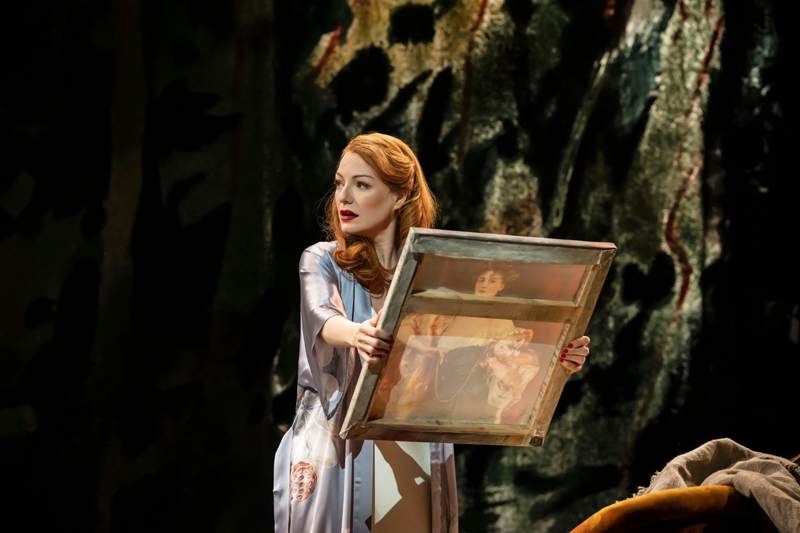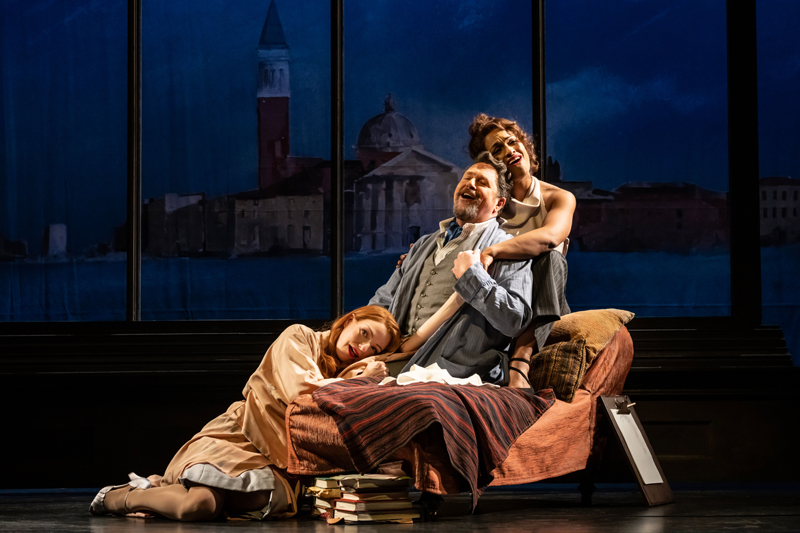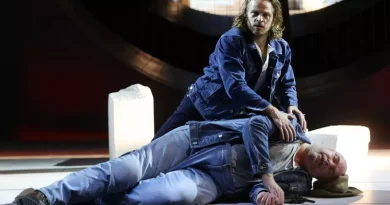“Aspects of Love” at Lyric Theatre
Mark Shenton in the West End
26 May 2023
Aspects of Love, originally premiered in the West End in 1989, occupies a mostly forgotten middle spot in Andrew Lloyd Webber’s output between the still-running The Phantom of the Opera (1986) and Sunset Boulevard (1993), the latter being set to return to the West End in a reimagining by director Jamie Lloyd (opening at the Savoy in September).

Laura Pitt-Pulford as Rose. Photo credit: Johan Persson.
It had a respectable run of just over three years at the Prince of Wales (and returned to the same address in a different touring revival in 1993), but its Broadway transfer in 1990 ran for less than a year. Chamber-scale productions were also mounted by its original director Trevor Nunn in 2010 (at the Menier Chocolate Factory) and at Southwark Playhouse in 2019 (transferred from Manchester’s Hope Mill).
But despite those efforts to reclaim it, it is still an also-ran in Lloyd Webber’s forever ground-breaking catalogue, even if it did produce a chart hit for the composer with Michael Ball’s breakout song “Love Changes Everything”, which itself changed everything for Ball himself, who graduated from juve lead to become an above-the-title theatre star as a result.
Now 34 years after Ball first played the young romantic lead Alex Dillingham, he has returned to play that character’s priapic uncle Sir George Dillingham, who seduces Alex’s actress girlfriend Rose away from him. And Ball has also prised Alex’s big song “Love Changes Everything” away from him too, to deliver it as George to whom the song has been reassigned. Fair dues – it’s what the audience wants – and is par for the course with the kind of selfish behaviours to be expected by these narcissistic characters. The show is all about each of them insisting on having their own needs met, regardless of consequences.

Laura Pitt-Pulford, Michael Ball and Danielle de Niese.
Photo credit: Johan Persson.
There’s more than a nod to the heady romantic intoxications that propel Sondheim and Wheeler’s 1973 musical A Little Night Music whose solipsistic characters likewise pursue ill-fated romantic assignations. While the latter show’s Desiree Armfeldt is giving her Hedda in Helsingborg, Rose here is also an Ibsen actress, giving her Hilda in The Master Builder. And just as middle-aged lawyer Fredrik Egerman’s young bride Anne in Night Music elopes with his young son from his first marriage, so George’s teenage daughter in Aspects of Love becomes romantically attached to his nephew (when she’s now a revised 18-year-old instead of the 15 in the original, presumably as an effort to make it seem less predatory).
But co-lyricists Don Black and Charles Hart cannot match the intricate wit and gleaming grit of Sondheim, with the result feeling a lot more plodding and padded. And after the lush romanticism of Lloyd Webber’s The Phantom of the Opera, set to lyrics by Hart, this story – based on a minor Bloomsbury-set novella by David Garnett – is altogether less satisfying.
The evening’s pleasures are provided instead by the sumptuously designed scenic work of opera and ballet specialist John Macfarlane, whose gorgeous painted backdrops are accompanied by evocative video and projections by Douglas O’Connell, and of course Lloyd Webber’s insistent ear-worm of a score that sounds lush and lovely, played by an onstage band under the supervision of Nicholas Skilbeck and musical direction of Cat Beveridge, newly re-orchestrated by Tom Kelly to sound freshly minted.
An A-list cast sing it beautifully – Laura Pitt-Pulford is both gleaming sounding and gorgeous looking as Rose, Glyndebourne and Metropolitan Opera House star Danielle de Niese is luxury casting as George’s Parisian sculptor mistress Guilietta, Jamie Bogyo (last seen in Moulin Rouge! playing another love-battered young man) is dashing as Alex, and Michael Ball is totally at ease as George.
But though Jonathan Kent keeps the show’s intrigues buoyant, the narcissistic parade of characters is difficult to like, let alone care about. It feels heartless and joyless, even as your ears are bathed in often sublime melodies.
.
.
~









